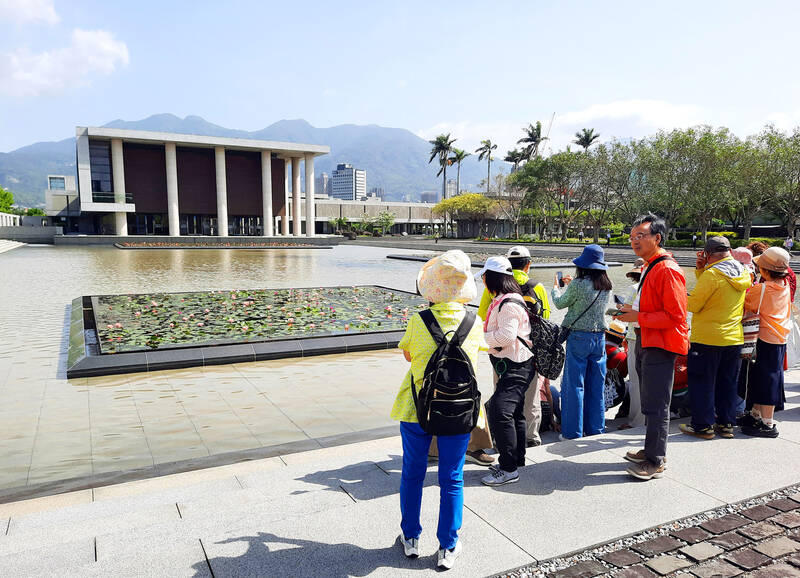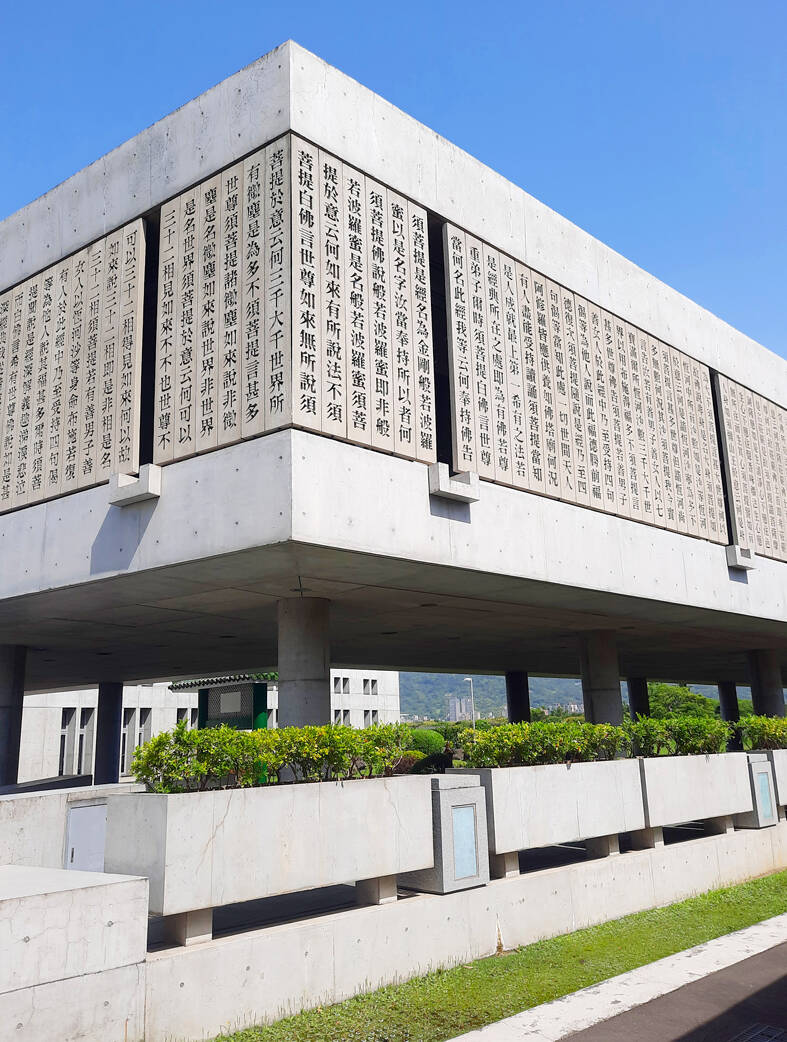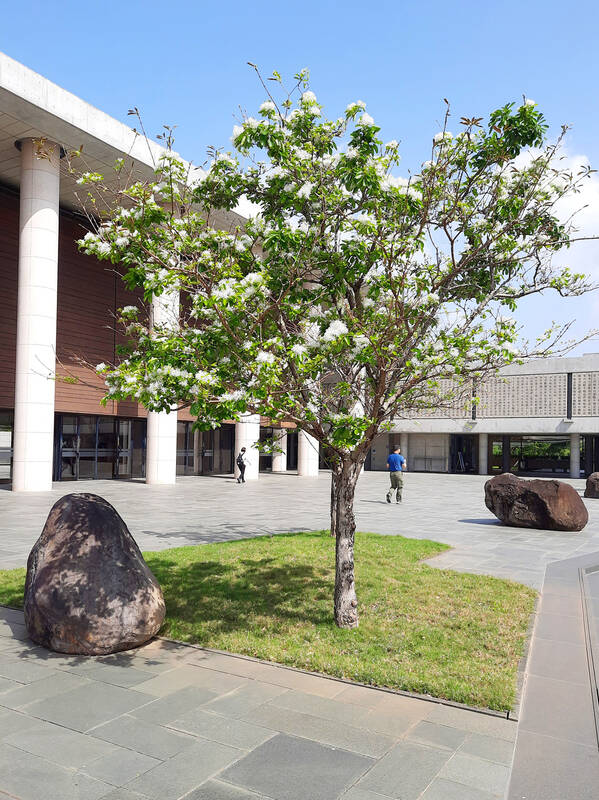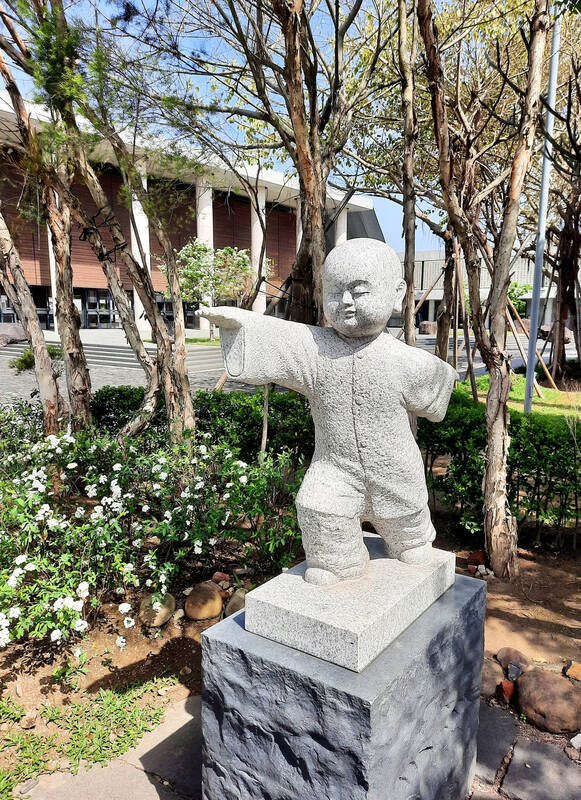Dull functional structures dominate Taiwan’s cityscapes. But that’s slowly changing, thanks to talented architects and patrons with deep pockets.
Since the start of the 21st century, the country has gained several alluring landmark buildings, including the two described below.
NUNG CHAN MONASTERY

Photo: Steven Crook
Dharma Drum Mountain (法鼓山, DDM) is one of Taiwan’s most prominent religious organizations. Under the leadership of Buddhist Master Sheng Yen (聖嚴), who died in 2009, it developed into an international Buddhist foundation active in the spiritual, cultural and educational spheres.
Since 2005, DDM’s principal base has been its sprawling hillside complex in New Taipei City’s Jinshan District (金山). But its original headquarters were closer to downtown Taipei. A few years before he died in 1977, Master Tung Chu (東初) — Sheng Yen’s predecessor as patriarch of the Caodong school (曹洞宗) of Chan Buddhism — founded Nung Chan Monastery (農禪寺) on a site in the capital’s Beitou District (北投).
Nung Chan translates as “farming Chan” (in the English-speaking world, Chan is better known as Zen) and it was here that Tung Chu and his followers cultivated food crops as well as religious devotion.

Photo: Steven Crook
Having outgrown their original two-story concrete building (which still stands; it houses a DDM exhibition open to the public from 10am to 4pm daily), the Buddhists added several temporary shacks. Not only were these uncomfortable and unsightly, but they also didn’t help DDM in its efforts to stay put.
When the authorities began to plan Guandu Nature Park (關渡自然公園), there was talk of clearing those structures and expropriating the land. In 2004, however, Sheng Yen was successful in getting the Taipei City Government to recognize the historic value of the original building. Finally able to make long-term plans, DDM commissioned “starchitect” Kris Yao (姚仁喜) to design a landmark that would embody the group’s ideals.
Sheng Yen told Yao that, while meditating, he’d envisioned the monastery as “a flower in space, the moon in water” — hence the landmark’s alternative name, Water-Moon Monastery (水月道場). The 80m-long lotus pond due south of the main hall is perhaps the most popular part of the monastery among secular visitors.

Photo: Steven Crook
As you enter the austere main hall, you’ll see a notice in English and Chinese. It invites everyone to pay their respects to the white Buddha statue at the far end, while stipulating that photography, sitting down, meditation and the chanting of sutras aren’t allowed.
The entire complex is kept spotless by a small army of groundskeepers. Every volunteer I came across smiled, but some online reviews imply they show a Taliban-like intolerance of behavior that could be construed as demonstrating male-female affection.
Instructions at the entrance ask visitors to dress plainly and speak softly, and “to experience every brick, tile, plant and tree with a Chan mind.” There’s also a list of prohibitions: No meat, alcohol or betel nut; no revealing clothes or casual footwear; and no pets.

Photo: Steven Crook
This environment undoubtedly appeals to many people, but I found the atmosphere strict and sterile. It wasn’t stressful per se, yet as soon as I stepped back into the bustle of the city, I felt myself relaxing. It’s not often a place of worship has that effect on me.
GETTING THERE
From Qiyan station on the Taipei Metro’s Red Line, leave by Exit 2 and walk southwest. When you cross Daye Road (大業路), you’ll see a smallish sign in Chinese pointing down Lane 65. The monastery is at the end of this lane. If you’re driving, head for the monastery’s parking lot on Dadu Road Section 1 (大度路).
CLOUD GATE THEATER
Cloud Gate Dance Theater (雲門舞集) is one of very few Taiwan-based performing arts groups to have made a splash overseas, and its founder Lin Hwai-min (林懷民) is among the country’s best known cultural figures.
But it hasn’t all been plain sailing for the troupe. In early 2008, a catastrophic fire destroyed its center of operations in New Taipei City’s Bali District (八里), along with costume, props and archives accumulated over more than 30 years.
The dancers resumed rehearsals the following day, but it would be seven years before Cloud Gate could move into its new permanent home, across the river in Tamsui (淡水).
A building that once housed Radio Taiwan International was radically reshaped by Huang Sheng-yuan (黃聲遠), a Yale-educated architect best known for a series of projects in Yilan. As reported in this newspaper (“Tamsui’s new treasure,” May 14, 2015) at the time of its inauguration, Cloud Gate’s new base was bankrolled by donors from across the world.
The interior contains performance spaces, dressing rooms, rehearsal studios, offices and even a meditation space. Visiting casually when there was no performance scheduled, I wasn’t able to go inside — but the trip was far from wasted. The spaceship-like exterior is easy on the eye, and the surroundings are lushly green. I wasn’t surprised to see one person meditating in the shade, and a young mom letting her infant run across the lawn.
There’s a reminder of the fire that forced Cloud Gate to relocate, in the form of a blackened and buckled freight container. It was one of several used for storage at the Bali site.
The huge deck on the western side of the building is populated by white sculptures that were gifted by artist Ju Ming (朱銘). From this platform, I could see some of the apartment buildings that form Danhai New Town (淡海新市鎮), the ocean in the distance and a freight vessel sailing northward.
If ever I come this way again, I’ll be sure to bring a picnic. And a folding chair. And maybe a good book.
GETTING THERE
The theater is on Lane 6 of Zhongzheng Road Section 1 (中正路), a few hundred meters inland of Hobe Fort (滬尾砲台) and Heping Park (和平公園). Walking here from Tamsui Station on the Taipei Metro’s Red Line takes the better part of 40 minutes. If that doesn’t appeal to you, catch one of the many buses that connect the station with points to the northwest, such as the #857. From the Hobe Fort/Martyrs’ Shrine/Golf Course (滬尾砲台/忠烈祠/球場) bus stop it’s 650m and slightly uphill.

Cheng Ching-hsiang (鄭青祥) turned a small triangle of concrete jammed between two old shops into a cool little bar called 9dimension. In front of the shop, a steampunk-like structure was welded by himself to serve as a booth where he prepares cocktails. “Yancheng used to be just old people,” he says, “but now young people are coming and creating the New Yancheng.” Around the corner, Yu Hsiu-jao (饒毓琇), opened Tiny Cafe. True to its name, it is the size of a cupboard and serves cold-brewed coffee. “Small shops are so special and have personality,” she says, “people come to Yancheng to find such treasures.” She

In July of 1995, a group of local DJs began posting an event flyer around Taipei. It was cheaply photocopied and nearly all in English, with a hand-drawn map on the back and, on the front, a big red hand print alongside one prominent line of text, “Finally… THE PARTY.” The map led to a remote floodplain in Taipei County (now New Taipei City) just across the Tamsui River from Taipei. The organizers got permission from no one. They just drove up in a blue Taiwanese pickup truck, set up a generator, two speakers, two turntables and a mixer. They

Former Chinese Nationalist Party (KMT) chairwoman Hung Hsiu-chu’s (洪秀柱) attendance at the Chinese Communist Party’s (CPP) “Chinese People’s War of Resistance Against Japanese Aggression and the World Anti-Fascist War” parade in Beijing is infuriating, embarrassing and insulting to nearly everyone in Taiwan, and Taiwan’s friends and allies. She is also ripping off bandages and pouring salt into old wounds. In the process she managed to tie both the KMT and the Democratic Progressive Party (DPP) into uncomfortable knots. The KMT continues to honor their heroic fighters, who defended China against the invading Japanese Empire, which inflicted unimaginable horrors on the

Hannah Liao (廖宸萱) recalls the harassment she experienced on dating apps, an experience that left her frightened and disgusted. “I’ve tried some voice-based dating apps,” the 30-year-old says. “Right away, some guys would say things like, ‘Wanna talk dirty?’ or ‘Wanna suck my d**k?’” she says. Liao’s story is not unique. Ministry of Health and Welfare statistics show a more than 50 percent rise in sexual assault cases related to online encounters over the past five years. In 2023 alone, women comprised 7,698 of the 9,413 reported victims. Faced with a dating landscape that can feel more predatory than promising, many in